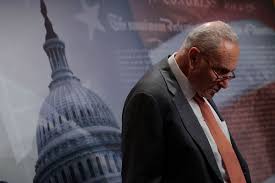Why Chuck Schumer Is Suddenly Embracing a Government Shutdown
Senate Minority Leader Chuck Schumer (D-NY) had no problem keeping the government funded earlier this year. But now, with October looming, he’s digging in his heels—and many are asking why.
The answer may lie less in policy than in politics. After collaborating with Republicans in March, Schumer faced backlash from the far-left, accused of “selling out.” In response, he seems intent on overcorrecting to prove his progressive credentials. Adding pressure is the looming possibility of a primary challenge from Representative Alexandria Ocasio-Cortez, whose rising influence and ambition in New York could threaten his position.

Yet this strategy carries real costs. Moderate voters, weary of high-stakes posturing, are increasingly disenchanted. Fundraising figures tell a stark story: Schumer raised just $133,000 in the three months ending September 30—far below the $337,000 he pulled in during the same period in 2022. By contrast, Ocasio-Cortez amassed $4.5 million in the same quarter. Schumer even spent more on his political operations than he raised, shelling out $322,000 over that period.
For perspective, Schumer typically draws millions as election season nears. In October 2022, he raised $5.9 million. As of October 2025, he sits on $8.6 million, compared with Ocasio-Cortez’s $11.8 million war chest. The combination of dwindling funds and pressure from his progressive base appears to be shaping his hardline stance.
Analysts argue this isn’t leadership—it’s survival theater. Opposition to routine White House spending may signal defiance to progressives, but it does little to win over the general electorate. Meanwhile, essential government operations, including military payrolls, remain in limbo, creating real-world consequences for ordinary Americans.
🔹 Reflection
Schumer’s current maneuvering highlights a dilemma faced by many senior lawmakers: balancing a vocal, demanding base with broader electoral realities. His reluctance to compromise reflects fear of internal backlash and concern over future election threats. But in the process, governance suffers. The so-called “Schumer Shutdown” underscores that political survival sometimes comes at the expense of effective leadership—and ordinary citizens pay the price.
